In mining, gold prospecting involves a sophisticated string of processes.
It requires specialised equipment, experience, and a never-ending pool of patience to pull off. When the mining company strikes gold, however, all the time, money, and resources they spent becomes well worth it.
The same can be said for keyword research within the context of marketing.
To find lucrative keyword opportunities, you need time, knowledge, and the right tools.
It matters not if you’re running a content marketing campaign for display advertising or organic SEO. If you want your investments to generate profitable results, you need to be diligent with your keyword research – no exceptions and no cutting corners.
Fortunately, performing keyword research isn’t nearly as complicated as mining for real gold. Of course, in this post, that’s what we’re going to talk about – finding lucrative keywords to target.
Choosing the Right Tool
Before anything else, you need to equip yourself with an effective keyword research tool.
It doesn’t have to be incredibly feature-rich, nor does it have to be a paid one.
A free tool like Ubersuggest already has everything you need to make a killing with your keyword research.
At this point, you might be thinking, “Out of all the keyword research tools on the internet, why Ubersuggest?”
There are several answers to that question, and we will highlight them throughout this guide.
For starters, however, one of the things you’ll love about Ubersuggest is the fact that you have only to go to their site to use the tool.
That being said, you don’t have to commit to anything to apply what you’ll learn in this post.
Without further ado, let’s boot up Ubersuggest.
Providing Your Seed Keyword
As with most other keyword research tools, Ubersuggest kicks off with a page where you can enter a seed keyword.
You can also specify a search platform and language to narrow down your research.

After you click “Look Up,” it’ll only take a few seconds before Ubersuggest provides you with hundreds of keyword suggestions.
For example, let’s go ahead and use “keyword research tips” as our seed keyword. This will yield the following results:
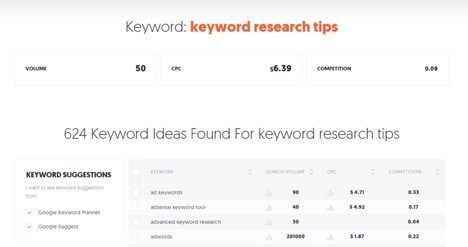
By default, Ubersuggest aggregates keyword suggestions from the AdWords Keyword Planner and Google Suggest. You can include or exclude either source via the checkboxes to the left of the keyword results.
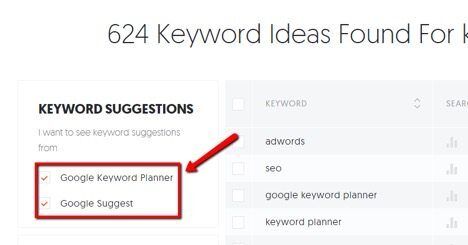
One of the best things about Ubersuggest is that it does a terrific job of pulling in long-tail variations of your seed keyword.
These keywords are usually less competitive than broad terms, which is why they are perfect for smaller brands.
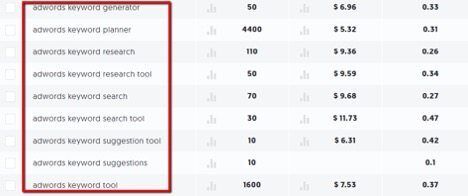
However, the keyword’s length shouldn’t be the only factor you’ll consider when doing research.
Now would be a good time to introduce the other valuable metrics you can unravel with Ubersuggest.
Checking Keyword Metrics
In the results page of Ubersuggest, you’ll notice three more columns alongside the keyword suggestions: search volume, CPC, and competition.
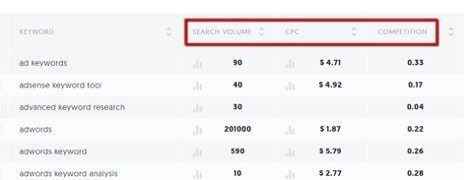
Search Volume
As you may have guessed, this metric denotes the average monthly search volume. This allows you to directly gauge the popularity and, naturally, the profitability of keywords.
CPC
Next up, the CPC or cost per click metric is the average amount advertisers would pay for clicks while targeting a specific keyword. Measuring the CPC allows you to check the profitability and the feasibility of keyword opportunities for your brand.
Competition
Lastly, Ubersuggest lets you measure each keyword’s competitiveness on a scale of 0.0 to 1.0. As a small business or startup, you should opt for keyword opportunities with a competitiveness rating of up to 0.4.
If you’d like to prioritise a certain metric when analysing your keyword suggestions, simply click on the “up” or “down” arrowheads in the column headers. These will sort the keyword suggestions in an ascending or descending order based on the corresponding metric.
For instance, if you want to focus on keywords with a high monthly search volume, click on the “up” arrowhead next to the “Search Volume” header.
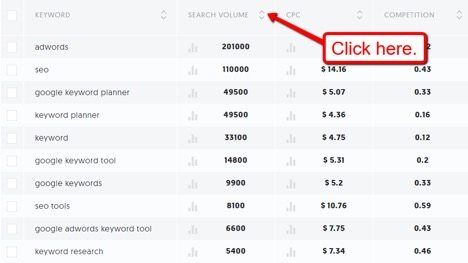
You can do the same when you’re trying to sort the keyword suggestions based on CPC or competitiveness.
As you can see with these steps alone, you’re on the right track to generating lucrative keywords for your marketing campaigns even if you’re doing your keyword research for free.
Finalising Your Research
To further refine your keyword research, you can use the filter options on the left-hand side of the results page.
The first option is to pick out keywords that contain a specific term. For this, enter another keyword in the “Filter Results” box and click the “Go” button.
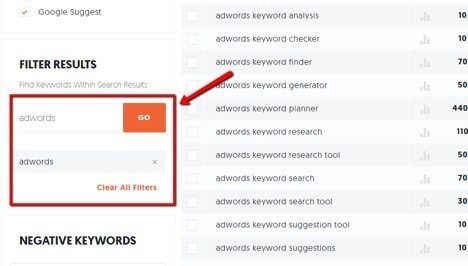
The second method is to specify “Negative Keywords” that you’d like to exclude in your research. This is useful if you want to eliminate branded keywords being used by your competitors.
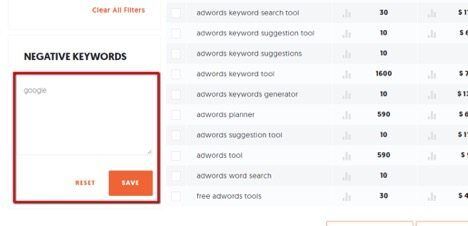
Notice how the total number of keyword suggestions shrinks as you use apply filters. If used in conjunction with the metrics presented, it’s only a matter of time before you spot the perfect keywords to use for your campaign.
Finally, Ubersuggest lets you quickly export keyword ideas into a CSV file. All you need to do is click the “Export to CSV” button at the bottom of the page.
Just remember that you must first select the keywords you’d like to include in your CSV report. To do this, click the check boxes adjacent to the keywords.
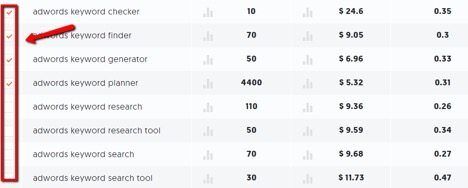
Additional Tips
No matter how capable Ubersuggest is as a keyword research tool, its effectiveness still depends on who uses it.
Now that we’ve covered a good bit of what the tool has to offer, here are a handful of tips that can help maximise your success:
- Localise Your Keywords Ubersuggest lets you target a specific location right off the bat, so be sure to use them whenever possible.
- Consider Purchase IntentApart from the keyword’s popularity, CPC, and difficulty, be sure to identify the purchase intent of people who use them. For example, a keyword with the terms “near me” indicate a strong desire to visit or purchase from a local business.
- Look for Customer QuestionsIf you’re conducting keyword research for content development purposes, you can filter your Ubersuggest results to include question-related terms like “how to,” “why,” and so
Conclusion
Finding profitable keyword ideas is like striking gold. If you process them well, they will surely give your marketing campaigns a significant boost.
Hopefully, the guide above helps you get the ball rolling with Ubersuggest. Just remember to be patient and let the metrics shown by the tool guide your decisions from this point forward. Good luck!






